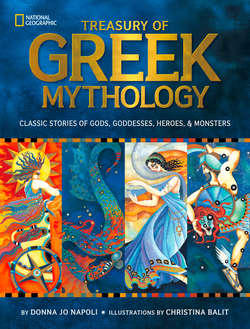Читать книгу Treasury of Greek Mythology: Classic Stories of Gods, Goddesses, Heroes & Monsters - Christina Balit - Страница 13
Оглавление
During the period when Cronus ruled the world, the Titans lived large, some on the land and some in the seas. The deepest oceans were the haunt of Oceanus, a Titan brimming with the need to spread his waters everywhere. His sister Tethys swam beside him, lithe, graceful, and white-haired. Not gray—she was not aged. Not silver—she was not a source of light. True white. Pure as mother’s milk. It was that white hair that had captured Oceanus. He took Tethys as his wife.
Together they created so many sons, all strong rivers, from the great Nile of Egypt, to the famous Skamander of Troy, to the many that emptied into the friendly Black Sea. They swirled in eddies, they rippled with gusto, they rushed over cliffs and fell in loud, energetic sheets to the rocks below.
Then Oceanus and Tethys created so many daughters, all water nymphs, some inhabiting pools in foothills, some splashing in springs, some slipping through swamps. Each nymph was unique: one rosy, one nimble, one soft-eyed, one knowing—all charming.
When Zeus, the youngest son of Cronus, deposed his father and took his place on the throne as king of the universe, his eye fell on one of these nymphs, and he was indeed charmed. Metis, known as the wise one, seemed to flow like water to Zeus, cool and soothing. Watching her was like swimming in a clear, bubbling spring. He was smitten. And since he was king and felt he deserved anything he wanted, he simply took her as his wife. Metis soon had a child growing within her.
BIRTHPLACE of Democracy
Athena gave the olive tree to a special city, thereafter named Athens. Around 500 B.C., Athens decided citizens should vote. Democracy was born! But women were not included. Men had many powers unique to them. The only power unique to women was childbearing. In the Athena myth, Athena is born from Zeus’ forehead. Certainly the Greeks knew men don’t give birth. But maybe they wished men did, for Uranus, Cronus, and Zeus, each in his own way, tried to take this power from womanhood.
Olive trees in front of ancient ruins in Athens, Greece
That’s when Zeus’ grandmother Gaia and grandfather Uranus gave him the ugly warning that, by now, he almost expected: Metis would bear him a daughter and then a son, and the son would be invincible. That splendid son, that wretched and hateful son, he would overcome his father. The curse felt never-ending: Uranus was overcome by his son Cronus, Cronus was overcome by his son Zeus, and now Zeus would be overcome by the son that Metis was fated to bear him.
Zeus would have none of it. His grandfather Uranus had tried to prevent his overthrow by imprisoning his children inside their mother Gaia. A failed attempt. His father Cronus had tried to prevent his overthrow by imprisoning his children inside himself. Another failed attempt. Zeus was smarter than either of them. He opened his mouth wide and drank Metis—simply drank her, like a glass of the best sparkling water in the world. So long as she was trapped inside him, he could never make a son with her, so the prophecy was null and void.
